|
|
The
Award Winning Agonies
Literary Awards
& Our Book-Buying Habits
The
Agony Column for December 20, 2003
Commentary
by Rick Kleffel and Terry D'Auray
|

|
|
As the New Year approaches,
the lists start coming out of the woodwork. Most of the awards have
already been given. Paperback book covers are jiggered to include nominations
and awards as well as the usual Stephen King blurb. And as the fingers
reach for the volumes on the shelves and display tables or click on
the image of a desired title, all those prizes do their job -- or do
they? What precisely is the job of a prize, but ultimately, to reward
the writer by increasing the sales of the current and subsequent editions?
Terry D'Auray's recent review of Julia Spencer-Fleming's multi-award
winning novel 'In
the Bleak Midwinter' got me to thinking about awards
and prizes. As did my own infatuation with Faber & Faber's Booker
Prize-winning 'Vernon God Little'.
The more I thought about it, the more I realized that prizes and awards play
a pretty big part in my book-buying habits, and perhaps not always a positive
one. The waters are murky enough before the fan, peer and self-appointed start
divvying up and handing out the loot. But literary awards are at least literary.
It's not the gutter-sniping kind of trash you find annihilating sequential Sunday
nights with hand-wringing bouts of self-congratulation. Not exactly, at least.
|
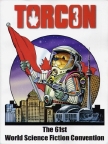
|
A
Big Ol' Party!
|
As a reader who trends towards speculative and genre fiction, there's no shortage
of
awards for me to pay attention to. Perhaps to bolster their own image as opposed
to
the more literary branches of fiction, or just because they like to get together
for a big ol' party, genre authors seem to create awards as often as they create
monsters, and often with a similar effect. People are picked up, chewed up, swallowed,
digested, recycled and used as fertilizer for the next award or recipient. It's
not always as pleasant a process as it's cracked up to be.
But awards have a lot of clout on the reading experience, from beginning
to end.
You can't just write them off by saying, "In the end, awards are meaningless." Before
I could even finish typing the sentence, I realized it wasn't true. If you're
reading a book that you bought with an award sticker or approbation on it, then
your opinion of the work is going to feed from and feed to your opinion of the
award. You enjoy that book, and hot damn! That award really means something to
you. You hate that book and that award suggests its own worthlessness to you.
That book has no sticker on it, you might think it deserves some kind of award
-- and be disappointed when it's not even nominated, which frequently happens
to me. Not matter what the "award state" of the book may be, if you're
aware of awards, then chances are your reading experience will be affected by
that award state. Admittedly, this isn't everybody, but it's a significant percentage
of the reading audience.
But where awards really effect the reading experience is in helping to -- or
hurting by -- narrowing down the range of selection from which you decide to
buy books. This was what I was particularly interested in. As I began to do what
passes for research here at The Agony Column, I found myself more and more inundated
with data. First and foremost, let this part of the column count as my disclaimer.
As much as I've tried to ensure accuracy in compiling what I know about the awards,
there's some possibility I made a mistake. If that's the case, blame me and let
me know. And, if you want to know more about literary awards, your best friend
is your favorite search engine. There is a site that specializes in literary
awards, which I consulted a few times, called 'Literature
Awards [This site for
sale contact 1-555-1212].' It wants to be a one-stop shop for this sort of
thing, but didn't quite give me everything I needed, though it was very thorough
and
might be perfectly suited for most readers. Awardweb.com has quite a bit of useful content as well. Occasionally, I found myself
trawling through contradictory reports for awards given on the websites dedicated
to those
awards, and some contradictions could not be resolved.
|
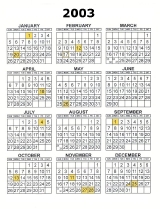
|
|
| A
year of books and awards. |
So, just to give myself an
idea as to what I was talking about, I tried to go back and get the award winners
and nominees for the contests awarded in calendar
year 2003. There were so many awards I found influenced my buying decisions,
I had to put them all in a spreadsheet. I quickly decided that I wasn't going
to examine all the categories in every contest. This was because well, there
are lots of literary awards given that don't really affect my buying decisions
(best art*, for example), and because, well, I wanted to make a point, not drown
in data. So for those contests where there are lots of non-literary categories
-- quite common in the genre-based awards -- I kept the selections to novels
and short fiction. This was basically because the awards given in those categories
were the ones most likely to influence my book-buying decisions. Now, it's true
that I'm giving anthologies the short shrift in this decision, but to be honest,
I to read novels or novel-like things. That might bring some to object to inaccuracies
in the generalizations I make. They can get in line and join the club. Because
once I started that list, it kept growing. And growing and growing...
(*Not that cover art is not important in influencing my buying decisions -- it
is -- but the awards for cover art don't influence my buying decisions, though
they often reward artists whose work has influenced my buying decision.)
Then I made the mistake of starting to take a few notes for the column.
In those notes, I started listing the different effects that awards
can have on buying
behavior. Then I started listing different "types" of awards,
not actual awards, but descriptions that suggested some of the behavior
that
led to or grew
from the awards. Alas, this list became a brain-eater and soon grew into
it's own unhallowed set of demonic entities, which I've posted separately
-- a list
of Award Effects and Award Categories. Because I am in some ways Deeply Evil,
I
sent it to Terry D'Auray, who made a number of helpful additions. I'll refer
to them
in the column, but the lists are lot more fun by themselves.
Here's the Awards Overview I came up with. It covers what I could find of the
awards given for last year's Hugo, Nebula, the British Fantasy Award, the Stokers,
the IHG awards, the World Fantasy Awards, the British SF Awards, the Arthur C.
Clarke award, the Philip K. Dick Award and the lone literary wolf in this pack,
The Man Booker Prize. We'll get back to each award contest itself soon, but a
word
about
the
overview
is
in order.
|
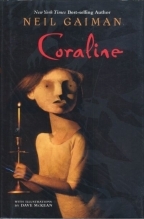
|
|
| A very
good book indeed. |
As a reader, this overview
tells me quite a bit about what I've read and what I should read. How many
times does Neil Gaiman's lovely little 'Coraline'
show
up on this list? Six times, that's how many. And Gaiman's name itself? Eight
times. So if I wasn't reading Gaiman (I am) or hadn't read 'Coraline' (I have),
well, I'd have to think that I was missing something. I'd be right. I loved 'Coraline',
though there's just a bit of nagging suspicion that super-smart, fairly short,
nicely illustrated entries suitable for those ages eight years old to adult have
a bit of an edge over longer and more difficult titles. If you're a harried writing
professional looking to read as many nominated titles as you can before the voting
deadline, it would be my intuition that works like 'Coraline' naturally trend
towards the top of the queue. But nothing can detract from Gaiman's accomplishment
with this novel. It's smart, funny, very intelligent and well worth reading and
re-reading.
But any theory that short, easy and great books have the edge could be easily
quashed by running a search for China Mieville's name, which you'll find pops
up eight times. He gets nominations for two of his novels, 'Perdido Street Station'
and 'The Scar' and his short stories as well. Both 'Perdido Street Station' and
'The Scar' are book-bricks of the finest quality, and neither is a particularly
easy read, though you'd have to tear them out of my cold, dead hands. But if
you're not reading Mieville, a glance at this chart suggests you should be.
|
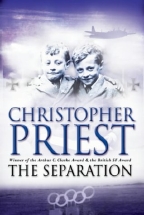
|
The
forthcoming hardcover edition from Victor Gollancz.
|
And, as far as the allure
of the difficult goes, you've got a number of nominations for Christopher Priest's
'The Separation'. This is a dense, complex novel about
doppelgangers, time branches and identity. The fact that it garners three notices
for Best Novel is significant not only because this is a challenging literary
work, but also because it was released in a very limited printing by a publisher
who sort-of dumped it in a trade paperback format as an afterthought. Turns out
the damn thing was a masterpiece! Victor Gollancz is righting the wrong, fighting
injustice and hoping to cash in a bit by releasing it as a hardcover novel next
year, which means, in the twisted world of genre fiction awards, that it might
be up for more awards.
Jeffrey Ford also shows up a lot, and it's my hope that he reaps the rewards
with paperback bestseller sales for his novel 'The
Portrait of Mrs. Charbuque'.
He also gets lots of short-story nominations, which should set a fire under any
remaining copies of his magnificent Golden Gryphon collection 'The Fantasy Writer's
Assistant'. Michael Swanwick shows up a lot. I noticed this at WorldCon and my
buying eyes tilted accordingly. Kim Stanley Robinson and Charles Stross ring
up a few times. All of this should alert me that something's up with these authors.
Let's say the data confirms what I've suspected.
The obvious suggestion here is that nominees for awards are almost more useful
than award winners. Looking at the nominees, you have a wider field of choice
and a greater likelihood of finding a writer or work that's in tune with your
tastes. The range of nominees suggests the tastes served by the awards. For me,
it's the nominees and not necessarily the winners who are of interest. Book-blurb
writers and cover designers should most certainly take note of this and mention
nominations as well as actual awards. We don't always traipse about with the
lists to hand.
As I started to cover the awards, I found myself making another spreadsheet,
now called the Award
Structure Spreadsheet. You can look at here to find
what
I
consider
the
three,
no
four, no five most important facts for an award; the name (so you can identify
it),
the
organization
giving the award, who qualifies to vote, how voting is conducted, and what time
period is covered by each award. Wait, make that six -- I need to add the website.
OK, I'm stopping now. I've been dazed and confused for so long...well, a spreadsheet
suggested itself and here it is. Terry D'Auray covered the mystery side of things. Use
this handy summary when you're going to the bookstore or shopping online
and
you'll
never
wonder
who
or how
about
a prize
again!
|

|
|
| Fuck,
it's a Hugo! |
As I started to think about
each award individually, the Hugo naturally came to mind first. Quoting from
the website, "The
Hugo Award was named in honor of Hugo Gernsback, 'The Father of Magazine
Science Fiction.'" I
wrote about my experience of the award
ceremonies, which I found entertaining
and tightly run. However, even at the time I was a bit unclear on the concept
of how the awards were chosen. Determining how they're chosen isn't as easy as
it might seem, even if you just go to the Worldcon
website. Works are nominated
from the previous calendar year. But first and foremost, Hugos are a convention-based
award, and by that I mean a gathering of glasses-wearing science fiction writers
and readers ready to party until the servers crash. You cannot get a "life
membership" to the WSFS. You have join each year, by purchasing either an
attending or supporting membership to the convention. Anyone who pays can join
and vote. That means that this is a fan-based award, and though certainly the
professionals who join vote, they are not the majority of voters. The vote is
a popular vote, with some odd run-off sort of things that happen. I'm sure that
folks will write to clarify the many muddy waters I know these rivers run through.
Both the vote and the awards are administered by the Worldcon committee for that
year. Worldcon committees vary from city to city, though some folks stay on for
more than one year and keep certain thread of consistency.
|
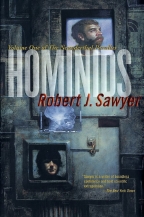
|
A
teapot tempest.
|
The
effect of this setup is clear. With awards chosen by anyone who pays the fee,
the Hugo can easily become popularity contests. But these contests
can be
heavily biased by the location of the convention. Often, the majority of attendees
are going to be from the city/state/country in which the convention is held.
So when Canadian author Robert Sawyer won best novel last year at a convention
held in Canada, there was an undercurrent of carping about nationality-based
voting. Also, attendees are not prevented from voting for awards to works well
outside the realm of what most might think of as "science fiction".
Works of fantasy, horror and even magic realism might find their way into the
nominees.
The applicability of Hugo awards for you the reader then, is based on
how much in tune your tastes are with those of Worldcon attendees, who
are essentially
mainstream heavy-duty science fiction fans. (If you can generalize about such
a diverse population.) Remember the definition of Hugo -- the word "magazine" in
particular. If you read and enjoy a lot of magazine science fiction, these are
the awards for you. Science fiction is to be commended for being such a strong
supporter of shorter format fiction. You certainly don't find this as much in
literary fiction, not on the professional level you do in SF. For me, the awards
are useful but they're not precision guides. I find work of interest in the nominees,
but not so much in the winners. In choosing my reading, I probably give Hugo
winners and nominees equal clout. For the Hugos, with the huge locality-based
conventions, the most entertaining aspect of the award may be the gossip. Run
by a rotating committee of dedicated fans, the awards have the occasional hitch,
such as this year when the short story selection was suddenly decimated by the
loss of what turned out to be an unqualified story. But remember also, that Hugos
reflect the direct opinions of thousands of heavy-duty book buyers. They're important
as all hell.
|

|
|
| A Nebula
Award. |
Next
in line are the Nebula awards.
The Nebula Awards are voted on, and presented by, active members of the Science
Fiction and Fantasy Writers of America, Inc.
These are the pro awards. You can't just join the SFWA. It's a writer's group,
and you have to have sold fiction at the rate of 3 cents a word before 2004 or
5 cents a word after 2004; there are lots of other qualifications as well at
their website. That can be the cause of some controversy, as it prevents writers
in so-called amateur markets from joining. It certainly prevents fans from joining,
unless they're also pros. Right now, the website tells me that SFWA has about
1,000 members. The awards purport to be for work published within the previous
calendar year in the United States. Because they only award works published in
the US, UK publications that are first published in the UK and published up to
a year or more later in the US can qualify long after their first publication.
This leads to the lovely anomalies like this year's Nebula nomination for China
Mieville's 'Perdido Street Station', published originally in the year 2000 in
the UK. In the world of the Hugos, his subsequent novel, 'The
Scar' was nominated.
OK, we get the picture. Read China Mieville.
Voting for the Nebulas is ranked, that is each voter is given multiple votes
in each category, to which scores are assigned. There are preliminary ballots
and final ballots. It's all pretty nebulous and rather arcane. If you want all
the nitty-gritty, here's the URL. A predilection for legalese is encouraged but
not required.
|
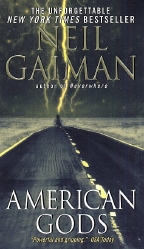
|
Fuck,
it's a Nebula-award winning novel of magic realism.
|
In contrast to the Hugos,
Nebulas can tend to focus more on pure science fiction. To my mind they
trend more towards harder-edged science fiction, but that's clearly
not always the case. Last year saw both China Mieveille and Neil Gaiman nominated,
with Gaiman winning a Nebula for his work of magic realism 'American Gods', which
won the Hugo for last year. Remember Gaiman's immortal words ("Fuck, I won
a Hugo!") and cue up the short speeches folks. Other choices indicate a
more traditional SF bias, for example Robert Metzger's 'Picoverse', itself the
subject of some controversy. For my own tastes, I find the Nebulas less useful.
I'm drawn to the exceptions of their rules. And remember again that the voters
are those defined as professional. Professionals of any profession look out for
their own. You don't have a literary organization that's gone to quite the trouble
to define professional that the SFWA has. Again, we're canting towards magazine
science fiction. It's great to see the support of short story writing, especially
since many short story writers graduate into fine novelists. But as a reader,
you need to keep that in mind when looking at the Nebulas and how they might
influence your purchases. Take a look at this
year's nominees. To my mind, they're a perfect example of what the Nebulas are about, good and bad.
|
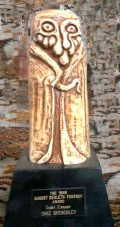
|
|
| Fhtagn
it's a British Fantasy award! |
One
step down on my spreadsheet are the British Fantasy
Awards, given
annually by the British Fantasy Society. Anybody can join the British
Fantasy Society,
as long as you can get them a cheque for £20-45, depending on where you
hail from. This is not to say that just anybody does, as evidenced by their awards.
From what I can discern via their website, voting is popular. It's unclear how
the nominees are chosen. The focus is UK-centric. For those of us in the US,
this is useful because we can see stuff mentioned that might not show up on our
bookshelves for a year, or at all. So before we let the credit card fly with
some overseas orders, here's a good place to look. Yes, I'll admit it straight
out -- these awards are very much up my alley. They're certainly quirky. The
2003 short fiction award went to a work that apparently wasn't nominated, Mark
Chadbourn's deserving 'The
Fairy Feller's Master-Stroke'. But still, I've only
read three of five "best novel" nominees. So it's not like I'm in lock-step
with these guys. They're a full-spectrum genre fiction award; science fiction,
horror, fantasy, weird fiction of all types is welcomed and found here. They
trend towards what most US readers would find obscure; but perhaps that's a reason
for US readers to look closely at the authors both nominated and winning.
|

|
A
Stoker.
|
Next
up are the Stoker Awards. They're presented by the Horror Writers Association,
AKA HWA. All works
published in a given year are eligible
and voting goes in
two passes; once for nomination and once for winning. According to the website,
they try to de-emphasize the competitive nature of awards by calling them awards
for "Superior Achievement". So here you have a mix that's similar to
the Hugos -- you have to pay to join the HWA, but anyone "with a demonstrable
interest" can join. These awards are for make-no-mistake-about-it horror
fiction. Now that could in theory include work from other genres -- say, the
SF horror of Neal Asher or John Shirley, and even the world of mainstream bestselling
literary fiction in the case of Alice Sebold's 'The Lovely Bones' or Chuck Palahniuk's
'Lullaby'. In general, though, you're talking horror, usually supernatural fiction,
selected from group of the Usual Suspects; King, Koontz, Douglas Clegg, Peter
Straub, Clive Barker and a host of others that had better be known by those who
have been reading my column. As a writer, I sort of hail from the world of horror.
If I'm not mistaken, I once belonged to the HWA, back when the acronym had a
different meaning.
|
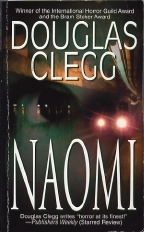
|
|
| "Winner
of the International Horror Guild Award and the Bram Stoker Award." |
Obviously,
you're only going to want to look at the Stokers if you want horror fiction.
Looking at this year's nominees and winners, there are lots worth reading.
The list is long and there are some conjunctions with worlds both literary and
science fictional. One of the reasons I read horror fiction is that it offers
a wide range of operation and a lot of variety. Tom Piccirilli crops up often
here. I admired his prose style in 'Hexes', but found the plot meandered a bit
within the lovely prose halls he'd set up. Looks like I might want to try another
novel. And since I've long enjoyed the work of Douglas
Clegg, I'm definitely
looking to get back to him. For horror readers, Douglas Clegg is the gift that
keeps on giving. In 1999, he started a mailing list and eventually published
in serial form via that mailing list the novel 'Naomi'. Since then, he's published
more fiction and offered his readers a wonderful look at the life of a writer,
with lots of giveaways of his novels and links to genre-based booksellers such
as Shocklines.com.
|
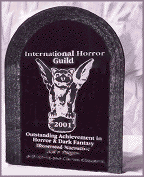
|
An
IHG Award to cap your career.
|
The
International Horror Guild Awards are the alternative to the HWA's Stokers.
The IHG was created in 1995 not as a support group for writers,
but strictly
to give prizes -- the IHG awards. The Stokers are a juried award selected by
a panel of judges, currently consisting of Edward Bryant, Stefan Dziemianowicz,
Bill Sheehan, and Hank Wagner. The awards are given "to recognize the achievements
of those who create in the field of Horror and Dark Fantasy." In theory
this opens up the field a bit as opposed to the Stokers, but in practice the
selection is very similar to the Stokers, though it is a bit more "international".
This year's selection of nominees includes the inevitable King novel, Ramsey
Campbell, John Connolly, the unknown-to-me (and therefore interesting) Gregory
Frost and winner Dan Simmons for 'A
Winter Haunting'. There's also a First Novel
selection, won by Alexander Irvine's quite nice 'A
Scattering of Jades'. There's
lots of action and interesting selections in the short fiction sections, which
according the web page are "under transition" and not the usual novella
and short story but instead "Long Form", "Intermediate Form" and "Short
Form". It sounds like income taxes to me.
The selection here is pretty interesting, with the winners both obvious
and obscure. I'm already all over Thomas Ligotti, and was glad to see
him win for his wonderful
'My Work is Not Yet
Done'. His win in the "Best Long Form" category
(did he do his taxes himself or did his accountant?) gives me reason to believe
that the other choices with which I'm not familiar -- particularly in the First
novel category -- will be of interest. And of course, I'll look for novels by
the winners in the forms of decreasing size. Were I buying books, the blurb "2002
IHG Nominee for Best Novel", would have a bit of heft, and I certainly plan
on keeping the list to hand when it comes to my book buying activities.
|

|
|
| My
Mirror Mirror Award. |
A
long favorite of mine is the World Fantasy Award. I always find good stuff
here and pay quite a bit of attention to who wins. For one thing, they seem open
to a wide range of fiction, and for another thing, the Mirror Mirror effect comes
into full sway here: they often agree with me, so they must be good! The World
Fantasy Awards are given at the World Fantasy Convention by the (wait for it)
World Fantasy Awards Judges. The judges are chosen by the (you guessed it) World
Fantasy Awards Administration. This is a previous calendar year award, open to
all types of fantasy. But to get considered, you have to send your work to all
five judges by no later than June 1 of the year following publication. They cast
a wide net and come up with a fascinating list of nominees and winners.
Gregory Frost comes up again here -- and that really makes him an intriguing
name to me. He was nominated for a Hugo, a Nebula and an IHG award. A writer
with that range is by definition of interest to me. One of my favorites from
last year, 'The Facts
of Life' by Graham Joyce shares the prize with Patricia
McKillip's 'Ombria in Shadow'. (McKillip is a favorite of one of my reading buddies.)
Every nominee for the World Fantasy Award is of interest to me, even in categories
not covered here. Nominee or winner, if it has a "World Fantasy Award..." blurb
on the cover, I'm going to pluck it from the shelves and take a gander at it.
|
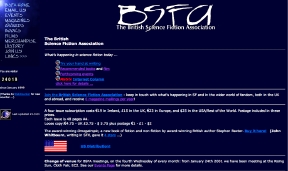
|
'Effin'
'ell, it's the bloody BSFA Home Page.
|
I'm also a fan of the British
Science Fiction Awards. The awards are given by
The British Science Fiction Association. Members of the BSFA nominate as many
as they want, and those who get the most nominations are short-listed then voted
on by members and by the attendees of Eastercon, where the awards are, uh, awarded.
For US readers, here's a great view into what's up with UK science fiction and
more. The BSFA awards, like the World Fantasy Awards, cast a wide net and bring
in material that some might not consider science fiction. Neither Christopher
Priest's Best-novel winning 'The Separation' or China Mieville's 'The
Scar' are
exactly science fiction, well, not at least in comparison to something like 'Picoverse'.
But the BSFA Awards are right-on with my own personal taste, so they must be
good. I've been told many a time that I should look into the work of Gwyneth
Jones, and her inclusion here bolsters those suggestions. There aren't very many
categories, which is also something of a plus in my book. It cuts down on the
confusion, though it also cuts down on the usefulness of the awards as it applies
to bringing more names into the potential buying queue.
|

|
|
| Revealed
as the Arthur C. Clarke Award. |
Since Arthur C. Clarke
was one of the first authors whose work I consciously collected when Ballantine
Books issued a paperback series of his novels and short
story collections in the early 1970's, it's no surprise that I pay attention
to the Arthur C. Clarke Awards. They make it easy by only nominating novels,
and winnowing down the selection further by requiring that those novels
be published
in the UK during the previous calendar year. Beyond that, anything goes. The
prize is given by three different associations; the previously mentioned BSFA,
the Science Fiction Foundation, and the Science Museum of London. It's pretty
UK-centric, which is alright by me and useful for American readers. Saying that,
I note that this year three of the five entries are by big-name US authors. For
me, the effect of this is to lend interest to American titles I might otherwise
have let pass. A blurb bespeaking an Arthur C. Clarke award nomination will always
get my attention. Alas, the funding for this award was partially provided by
Clarke's own publishing venture, Rocket Publishing, and they've just slashed
everything but the fiscal award itself as part of larger cutbacks at the company.
Hopefully the award will remain active, as it's always mirrored my tastes.
|
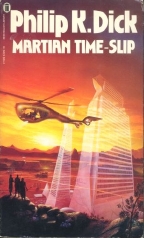
|
A
UK PKD paperback.
|
Ten years after
the glory days whence I collected Arthur C. Clarke paperbacks, I
read an essay by a favorite science fiction writer, Stanislaw Lem
that changed my reading habits. In it, he suggested that the only
American science fiction writer worth reading was Philip K. Dick.
Thus spurred by a writer I greatly admired, I picked up the novel
he suggested as the best, 'Ubik', and began collecting another paperback
series, the DAW paperback re-issues (and some UK versions as well)
of every damn Philip K. Dick book I could lay my hands on. It's
only natural that ten years after that, the Philip K. Dick Awards
swam into my consciousness. Created by Thomas Disch, the Philip
K. Dick Award is given each year to an outstanding achievement
in original paperback science fiction. Given my predilection for
cheesy paperbacks and Philip K. Dick, this award always gets my
attention.
|
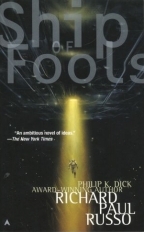
|
|
| Richard
Russo's 'Ship of Fools' won the 2002 PKD award. |
The setup for this
award is appropriately Philip K. Dickian. After the death of Philip
K. Dick in 1982, author Thomas Disch was inspired to create the award,
which now has its own website.
With the help of David Hartwell, he formed the rules and criteria, which
are simple, elegant and yield up fascinating work that might have been ignored
year after year. The awards are administered by the Philadelphia Science
Fiction
Society, and given each year at Norwescon, and headed the awards administration
for years until Dick appeared to him in a dream and said that his burden
was now lifted. The head administrators have since been Algis Budrys, Hartwell
and Gordon Van Gelder. Here's the rule: "Awards Criteria: The award is
given to a distinguished original science fiction paperback published for the
first time during the award year in the USA. A second award may be given for
the runner-up." The award is to be given to science fiction only, not
fantasy, but the judges are free to make their own decision as to what is
science fiction. A book can be published outside of the USA in hardcover,
and in the
USA in paperback and still be eligible, which is why China Mieville's 'The
Scar' shows up. Trade paperbacks are eligible, but not if simultaneously
published in hardcover.
A look at this
year's nominees will confirm that once again, the Phillip K. Dick
Awards are doing their job. I'm always inclined
to prefer a hardcover edition of a novel. But for example, Del Rey's decision
to release Richard Morgan's 'Altered
Carbon' in a cheesy-looking trade
paperback, made it eligible for the PKD award. It's certainly a
very PKD novel; but
the other nominees are also interesting.
|
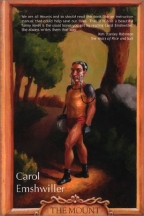
|
From
Small Beer Press, this year's PKD award winner.
|
While in theory any "type" of
science fiction is eligible, in practice, the awards cant towards works
not dissimilar to that of Philip K. Dick, that
is hallucinatory, surreal and on the literary side. You won't find much "hard" science
fiction, nor will you find fantasy celebrated here. But if you like the work
of Philip K. Dick, then the chances are you'll like what you find nominated
for and selected for this award. Past winners include the iconic 'Neuromancer'
by William Gibson, long before every console jockey and Hollowood cocktail-party
cool-guy wannabee knew about it. Robert Charles Wilson, Jack Womack, Richard
Russo's 'Ship of Fools'
and Liz Williams have been here; this year's nominees include an anthology
and
two
entries by Carol Emshwiller, one of which, 'The Mount', won. Dick's name has
proved to be a gold mine for the soul-stealers of Hollowood, so expect this
award and its winners to have a high profile for years to come.
|
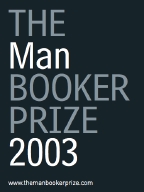
|
|
| Corporate
meets literate. |
And finally we come
to the lone literary award to which I pay much attention, the Man
Booker Prize. "Now in its thirty-fifth year, the prize aims
to reward the best novel of the year written by a citizen of the Commonwealth
or the Republic of Ireland. The Man Booker judges are selected from the country's
finest critics, writers and academics to maintain the consistent excellence
of the prize." Shoot me, I'm lazy, and this website quote
is as good as you probably need. And there's no annoying scroll involved. Before
you get
too excited about the prize, realize that it's sponsored by investors. But
they have our best interests at heart. On the other hand the website brags
about the integrity of the judging process. It's an interesting process. UK
publishers can submit up to two books per year, with five additional titles
for consideration. The judges must "call in" no
less than eight and no more than twelve titles for the "shortlist".
Every judge reads everything, everything is confidential. Publishers agree
to pay all sorts of expenses for this privilege and guarantee the paltry-seeming
sum of £1,000 for publicity if your title wins. The books are judged
for a year that begins October 1 and ends September 30. I actually misread the rules the first time round, and thought that authors could only be submitted once every ten years. On one hand the rules are fairly short, and it's not exactly legalese. But on the other hand, you can manage quite a bit of obfuscating oddness in a few short paragraphs. See the Booker rules for a fine example.
|
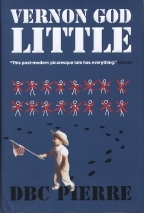
|
Faber
& Faber submit to win!
|
So yes, you've
got your literature here. But you can also get some rather weird
literature
here. Terry Pratchett told me that
at one point his publisher was
considering submitting 'The Thief of Time' for a Booker award. This year's
selection is shockingly enough, a wonderful sounding Faber & Faber
novel by DBC (Dirty But Clean) Pierre, 'Vernon God Little'. It's a nice
slice of
anti-Texas, anti American satire about the teenage survivor of a school
shooting who is left to take the hit for what his buddy went off and did.
Pick it
up in the bookstore and you can read enough to find out it's totally rockin'.
Now, last year's Booker Prize winner, 'The Life of Pi', didn't appeal to
me,
so it's not a consistent guide, but this year's shortlist includes a work
of genre fiction -- not exactly well-received by all, but nonetheless genre
fiction
-- by Margaret Atwood. Quirky, terse and very British, here's another insight
into what UK publishers think is their best work. Your mileage may vary,
but your interest is likely to be rewarded.
I asked Terry D'Auray to give me her thoughts on mystery genre awards,
which follow, with this overview.
Compared to me, Terry's a paragon of brevity and succinctness. Don't thank
me --thank
her.
|

|
|
| The
Edgar Award. |
In the mystery genre
there is a pot full of awards that read like a list of archaic first
names - Edgar,
Anthony,
Agatha,
Creasey (ok, that's a last name. John Creasy's the pseudonym king of
mystery fiction with over 500 titles and
28 pseudonyms if memory serves), and my personal favorite, Dilys.
The Dilys is named after Dilys Winn, founder of the first mystery specialty
bookstore,
New York's Murder Ink. It's awarded annually to the title the Independent Mystery
Bookseller Association "most enjoyed selling". Although the winner's
list reads like a who's who of top-rated mystery writers, most of them good,
I've always wondered what "most enjoyed selling" might really mean.
Is it a reflection of the storeowner's and staff's personal taste, the book
deemed most popular among the store's clientele, or - to be crass - the book
they bought by the truck-full because it generated that sweet cha-ching at
the cash register.
|

|
PacBell
Procedurals -- consider the source.
|
The most important lesson
to learn about awards is this - consider the source. Booksellers, writers,
publishers, and fans all have
different takes on quality,
different tastes, and vastly different criteria. I'm always amused by the "Daggers" -
Golden for first place, Silver for second - awarded to the best crime novel
of the year in the UK as nominated by publishers. Its full title is the Macallan
Gold Dagger/Silver Dagger, because it is sponsored by Macallan, distiller of
single Highland malt whiskey. It opens a whole new commercial opportunity in
this era of "sponsored" (bought and paid for) sports events and stadiums.
The Minute Maid Mystery, the Wrigley Gumshoe, the Heineken Historical, the
PacBell Procedural (AKA, the phone book) or the Comcast Cozy.
Once you figure out the source, and develop some sense of their
bias, awards can help control the literary traffic - flashing
red light or green light about
books you either will or will never read. In the mystery genre, the Edgar probably
carries the most clout and is the most commonly recognized. Named after Edgar
Allen Poe, the Edgars have been awarded by the Mystery Writers of America since
1945. While the MWA is open to writers and other professionals in the crime-writing
field, only active, or published, writers are allowed to nominate and vote
on Edgar winners. While open to petty squabbling and professional politics,
writers assessing the work of other writers make the most sense. They at least
know what it takes to write a book and get it published, and, one hopes, the
difference between good books and bad ones.
|
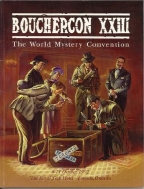
|
|
| They
know how to party at Bouchercon. |
On the other hand, the Anthonys,
the popular awards bestowed at the annual Boucheron World Mystery Convention,
are voted on by convention "attendees" -
writers, publishers or reader fans with the bucks to pop for conference fees
and travel. There's no guarantee that those doing the voting have actually
even read the books nominated. It's likely not all of them have.
Both the Edgars and the Anthonys are egalitarian in their nominations,
electing to cover all sub-genres without bias. Cozies vie against psychological
suspense,
police procedurals duke it out with the dime-store detective novels. While
I certainly take note of both nominees and winners of each award, their swath
is too broad to provide reliable guidance. They're yellow-light awards in my
view - proceed with caution.
Reflecting my sub-genre bias, I frequently hearken to the Shamus Award
winners and nominees in my reading selections. The Shamus Awards are "bestowed" by
the Private Eye Writers of America and announced at the Bouchercon each year.
Once again, however, beware - the PWA is open to writers, fans and publishing
professionals, all of whom vote. Lehane, Connolly, Pronzini, Block, Pelecanos,
Parker, Estleman, Crais, Sallis, Healy, Paretski, Muller, the list is impressive.
If I had but half of these in my library, I'd never surface again! And, there
are a few I'd even deign to part with to buy groceries.
|
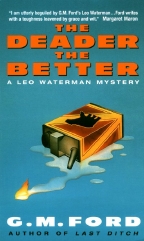
|
It
ain't just about who won.
|
The second rule of awards
is this - it ain't just about who won. I find nominees, both in the "best
novel" and especially "best first novel" categories
equally great reading fodder. But one recent example - the 2001 Shamus
Best Hardcover P.I. Novel was 'Havanna Heat' by Caroline Garcia-Aguilera,
a good-but-not-great
book. The other nominees in that category were Estleman's 'Smile on the
Face of The Tiger', G.M. Ford's 'The
Deader the Better', Stephen Greenleaf's "Ellipis'
and Marcia Muller's 'Listen to the Silence', all superb. There's more great
reading in the nominees than in the isolated winner.
Major awards ignite frenzy among avid collectors, many of who live and
breathe for that pristine copy of a 50-year-old Edgar winner. And truth
be told, if
you have a complete collection of Edgar winners going back almost 60 years,
you've likely retired to a luxurious villa someplace fancy - if you've sold
them - or are happily impoverished and facing a nasty space problem if you
haven't.
At the end of the day, awards help more than they hinder in selecting
quality books and authors. With an educated (ok, cynical) eye, awards
have led me to
find dashing and satisfying literary princes while kissing far fewer toads.
|

|
|
| Kissing
a toad. |
Thanks, Terry. Having gone
through all the awards at least the ones that I currently care greatly about,
and having read Terry's take on
the mystery
genre
awards, it's fascinating to think about the variety within. When you just
barely skim the surface as a book-buyer, and pick up that trade paperback
edition
of the [put Your Favorite Award Here] nominated or winning title, it's
easy to think prize=good. In general that might be true. But if you're
a fantasy
and weird fiction oriented reader, for example, then clearly the Nebula
awards are not going to be much help to you. If you're a mainstream
SF fan, then the
Hugos are probably worth following, with the proviso that they're subject
to a influence of a localized gravity pull depending on where the convention
during
which the prizes were nominated was held. BSFA and BFS awards are fine,
if you like British fiction and a potentially excellent way to winnow
down your
overseas shipping bill, if you have one. [And you'd better.] Every award
has it quirks and it helps to understand how the works are chosen for
and win any
given award. The more you know about an award, the better served you'll
be by the works that are nominated and win it. As with everything else,
an award
is a buyer-beware commodity.
For all the usefulness of all the awards, every year there are lots
of books that deserve your reading time that win no award nomination
or
prize. They
probably deserve them as much as those who do. They are often fantastic,
incredible books. It is possible to confine your reading and buying
to award-winning books.
As Terry points out, collectors may be well-served by doing just that.
As readers though, it's also fun to look beyond the awards, beyond
what everybody else
thinks is worth reading. Remember that as a reader, you give your own award,
the most important award a writer can win, every time you buy a book --
and again when you read it.
|
|
























